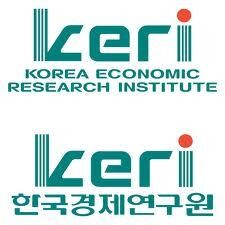hankyoreh
Links to other country sites 다른 나라 사이트 링크
Business world trembling over economic democratization

By Kim Kyung-rok, staff reporter
In her inaugural address on Feb. 25, South Korean President Park Geun-hye said, “In order for a creative economy to truly blossom, economic democratization must be achieved. I believe strongly that only when a fair market is firmly in place can everyone dream of a better future and work to their fullest potential.”
But how is economic democratization being viewed in the business world? A recently published essay provides some hints to those views. The essay, titled “Economic Democratization: Policy Assessment and Outlook,” was presented at the 2013 Joint Economics Conference, which was held from Feb. 21 to 22, by Song Won-geun a senior researcher at the Korea Economic Research Institute (KERI).
KERI, which is affiliated with the Federation of Korean Industries (FKI), counts among its members around 130 major corporations. For the past year, the institute has printed a series of newspaper columns and held various debates through which it has presented the grounds for opposing economic democratization. The essay presented by Song at the conference is in essence a summary of the discussions held in the business world and at the KERI about economic democratization.
“As the demand for economic democratization becomes greater and greater, it is likely that individuals will have to endure more restrictions in their everyday lives,” Song argues. “This could lead to another form of totalitarianism masquerading as democracy.”
This claim is part of an argument in the essay that first defines economic democratization as government interference in the market and then outlines a progression that starts with economic democratization, continues with the expansion of bureaucracy, and ultimately leads to totalitarianism. In opposition to Park, who is advocating economic democratization as a method for bringing about the happiness of the people, Song is essentially positing that economic democratization could lead not to the happiness of the people, but to something far different: tyranny.
One by one, Song examines the various policies related to economic democracy, including the regulation of the ownership and control structure of chaebol, increased stockholder rights for the National Pension Service, the suitable industry system for SMEs, the punitive damages system, and a stronger division between finance and industry.
“It is patently obvious, both in terms of theory and based on our experience, that restrictions on the activity and competition of corporations tend to reduce the incentive for corporations to innovate,” Song writes, labeling the policies of economic democratization as “anti-growth” policies that restrict the incentives for innovation.
In a phone interview with the Hankyoreh on Feb. 26, Song said, “The paper I presented at the conference contains my personal convictions as an economist, and not as a spokesperson for the business world or FKI generally. Since the paper is more of a draft than a completed article, some of the expressions contained in it were a little rough.”
Please direct questions or comments to [english@hani.co.kr]

Editorial・opinion
![[Column] Season 2 of special prosecutor probe may be coming to Korea soon [Column] Season 2 of special prosecutor probe may be coming to Korea soon](https://flexible.img.hani.co.kr/flexible/normal/500/300/imgdb/original/2024/0426/3317141030699447.jpg) [Column] Season 2 of special prosecutor probe may be coming to Korea soon
[Column] Season 2 of special prosecutor probe may be coming to Korea soon![[Column] Park Geun-hye déjà vu in Yoon Suk-yeol [Column] Park Geun-hye déjà vu in Yoon Suk-yeol](https://flexible.img.hani.co.kr/flexible/normal/500/300/imgdb/original/2024/0424/651713945113788.jpg) [Column] Park Geun-hye déjà vu in Yoon Suk-yeol
[Column] Park Geun-hye déjà vu in Yoon Suk-yeol- [Editorial] New weight of N. Korea’s nuclear threats makes dialogue all the more urgent
- [Guest essay] The real reason Korea’s new right wants to dub Rhee a founding father
- [Column] ‘Choson’: Is it time we start referring to N. Korea in its own terms?
- [Editorial] Japan’s rewriting of history with Korea has gone too far
- [Column] The president’s questionable capacity for dialogue
- [Column] Are chaebol firms just pizza pies for families to divvy up as they please?
- [Column] Has Korea, too, crossed the Rubicon on China?
- [Correspondent’s column] In Japan’s alliance with US, echoes of its past alliances with UK
Most viewed articles
- 1[Column] Season 2 of special prosecutor probe may be coming to Korea soon
- 2‘We must say no’: Seoul defense chief on Korean, USFK involvement in hypothetical Taiwan crisis
- 3Is N. Korea threatening to test nukes in response to possible new US-led sanctions body?
- 4Division commander ordered troops to enter raging flood waters before Marine died, survivor says
- 5Amnesty notes ‘erosion’ of freedom of expression in Korea in annual human rights report
- 6Is Japan about to snatch control of Line messenger from Korea’s Naver?
- 7No good, very bad game for Korea puts it out of Olympics for first time since 1988
- 8[Editorial] Korea’s surprise Q1 growth requires objective assessment, not blind fanfare
- 9N. Korean delegation’s trip to Iran shows how Pyongyang is leveraging ties with Moscow
- 10Korea’s 1.3% growth in Q1 signals ‘textbook’ return to growth, says government